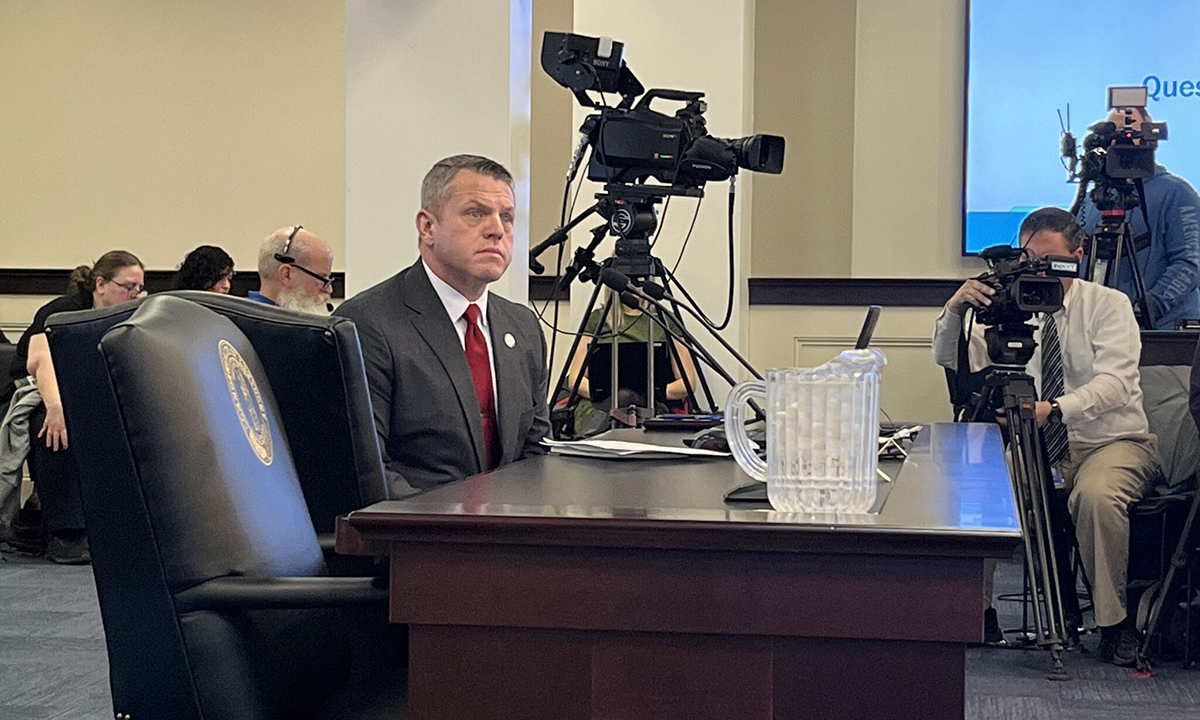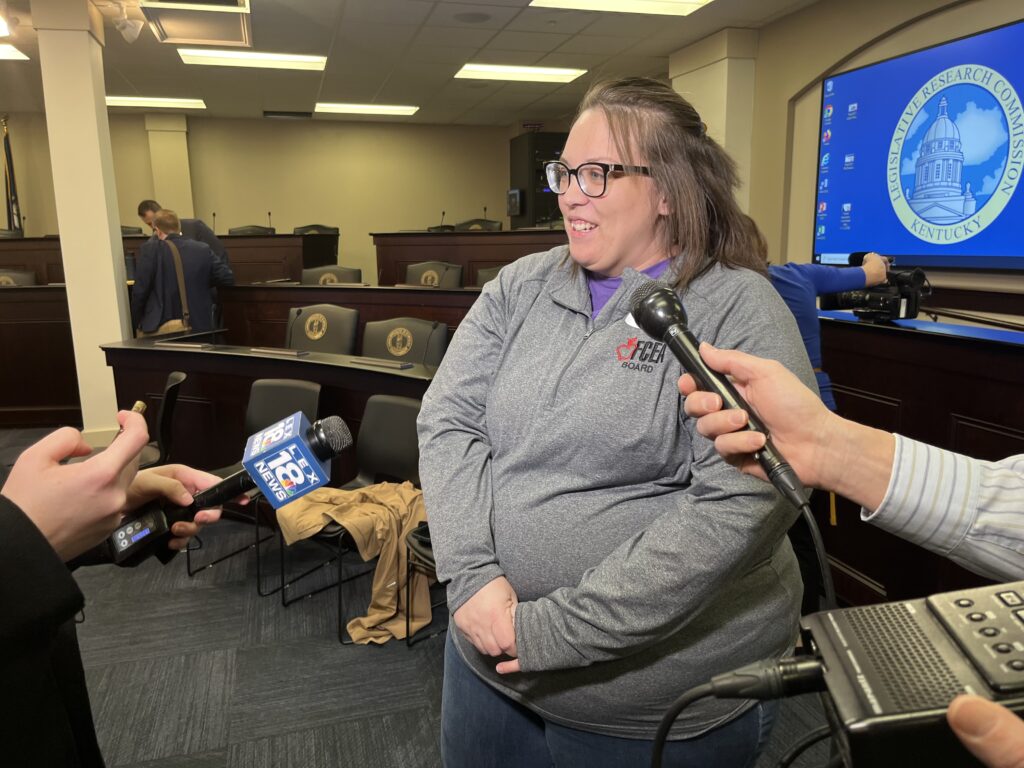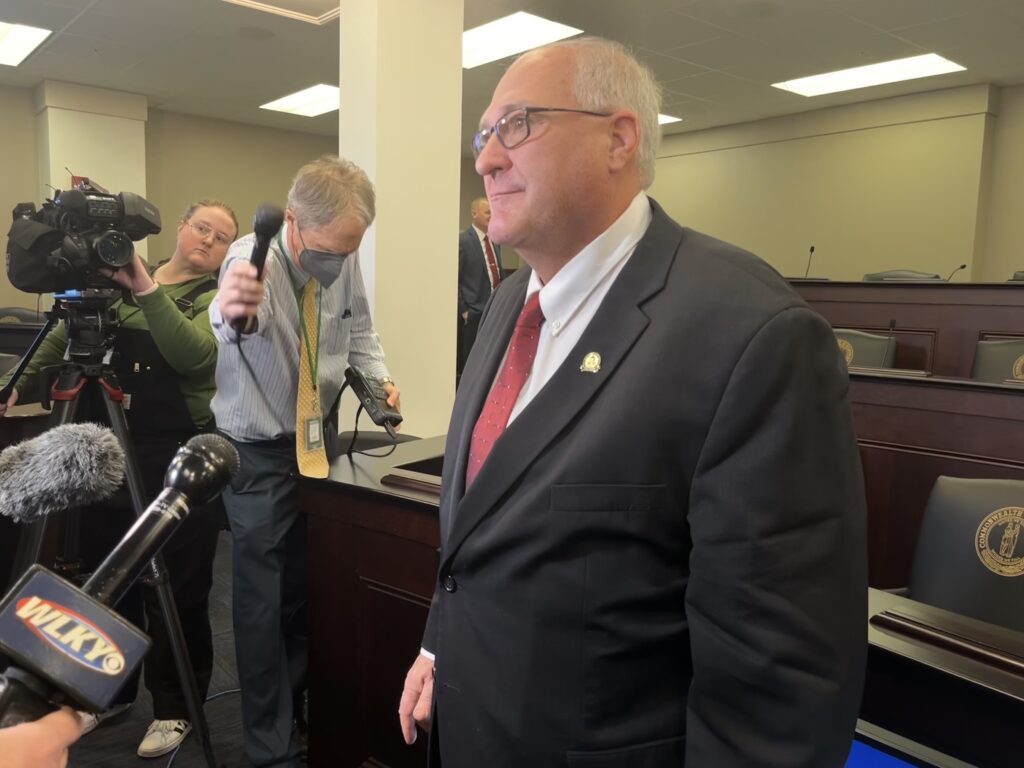Teachers Are Leaving the Profession for a Mix of Reasons, Say Lawmakers and Education Officials
The turnover rate has grown from 17% in 2017-18 to 20.4% for the 2021-22 school year

Get stories like this delivered straight to your inbox. Sign up for The 74 Newsletter
FRANKFORT — Kentucky’s teacher turnover rate is above the national average and growing yearly, Education Commissioner Jason Glass told lawmakers Tuesday.
On their first day back in session after a recess, the House Education Committee tackled the teacher shortage. Although no bills have been introduced, committee chair James Tipton said he’s working on a legislative package that will be ready soon to address the challenges of recruiting and retaining educators in Kentucky’s public schools.
The turnover rate — or the percentage of teachers that do not return to schools or new teachers who leave before the end of the school year — has grown from 17% in 2017-18 to 20.4% for the 2021-22 school year, Glass said.
He said the national benchmark is around 15% or 16% turnover.

State representatives on the House Education Committee marked the beginning of the second part of the 2023 General Assembly with questions about the state’s teacher shortage. Education officials on the agenda included Kentucky Department of Education Commissioner Jason Glass, who discussed with the committee what Kentucky’s shortage looks like and how school districts are responding to it.
“If we work on increasing total compensation, support for our educators and respect for educators, I believe we can begin turning the tide on this difficult issue,” Glass said. “I also think that we have to be clear eyed about the magnitude of the challenges that we face.”
The number of teachers joining the profession in Kentucky is fairly stable, Glass said. In the 2020-21 school year, more than 1,600 completed the traditional pathway into teaching and more than 570 completed the alternative pathway.
Glass said factors influencing teachers to leave the profession include pay, support and respect. The solution, he said, requires a multi-year effort that meets the scale of the problem.
‘Woke political agenda’
Some committee members questioned whether pay is driving teachers from the profession. Some also blamed safety concerns, a “woke political agenda” and policies respecting transgender and nonbinary students.
Rep. Russell Webber, R-Shepherdsville, said he has heard from teachers who complain of a lack of support from the state education department for their safety concerns in the classroom. He said teachers told him they were attacked by third graders. Pay was not among the reasons for leaving he heard from the teachers he spoke with, he added. He did not name the schools or the teachers.
House Education Committee Vice Chair Rep. Shane Baker, R-Somerset, pressed Glass about the department’s guidelines on using preferred names and pronouns of students. He referenced a previous comment from Glass about teachers finding another job if they cannot follow a district’s policies on preferred names.
“It was revised a few months ago after we had this conversation, but politics have entered way too much into education,” Baker said. “Education should not be about politics. I think there’s no question about that. Unfortunately, it gets put in there over and over and over.”
Glass responded saying that policies in school districts he worked in as a superintendent were clear on the subject. He and the local board of education expected “employees in the district would execute policies set forth by the district that were in alignment with best practice, and often in alignment with federal and state law.”
Rep. Jennifer Decker, R-Waddy, said the “woke political agenda” was among the top three reasons for leaving the profession in a survey of midwestern teachers published by the conservative blog Chalkboard Review. The article has since been removed from the site.

Responding to Decker, Glass said that the issue of politics is not coming from teachers.
“The people who are making pronouns and transgender issues and woke issues of priority in our education are politicians,” Glass said to some applause from the audience in the room.
One of the early questions was from House Education Committee Chair Rep. James Tipton, R-Taylorsville. The Courier Journal of Louisville last week fact-checked Gov. Andy Beshear’s months-long claim that Kentucky had a shortage of 11,000 teachers and found that 1,744 certified positions were posted during April 2022 to mid-January 2023, according to the Kentucky Education Placement System. Tipton asked Glass to discuss the KEPS.
Glass explained the system captures information about certified positions, not just classroom teachers. It also does not give a “good point in time” measurement as school districts can upload or remove vacancies.
“So while there’s some accuracy over a period in time over any point in time, it’s not a good dipstick for the number of openings that are in the state,” Glass said.
The 11,000 number, he added, “represents the total number of openings over an entire year. It doesn’t represent the number of openings that we have at any one time.”
After the committee meeting, Tipton told reporters that Department of Education officials told him the number of vacancies among certified educators was 1,517. He noted that still is a concerning number.
“So even 1,500 at the beginning of the second semester, that’s a lot of job openings across the state,” the chairman said. “And you have to recognize that in some of these rural counties, those positions have been open the entire year. They haven’t been able to fill them yet.”
As for possible legislation to address the issue, Tipton said he is still working on it and considering solutions to include. It could be introduced in the General Assembly by the end of this week or next.
What to do
Officials from the Kentucky Association of School Administrators also addressed the committee. Last month, KASA’s Coalition to Sustain the Education Profession released a report and policy recommendations on addressing the state’s teacher shortage.
Among the nine recommendations the officials presented to the committee Tuesday were a statewide application system, doing a comprehensive study of public education and funding incentives such as one undergraduate teacher education scholarship per school district and a $500 per week stipend for student teaching.
Amanda Sewell, a family consumer science teacher at Tates Creek High School in Lexington, is part of the coalition and addressed the committee. She works with high school students who are interested in becoming teachers. After the meeting, she said that her students who want to go into education are divided on how they arrived at the decision. Some knew instantly while others decided after taking courses.
Asked what high school students who are interested in a teaching career, consider, she said pay is a factor. For teachers, Sewell said, that means being compensated for long hours of work and in line with others who have earned master’s degrees and higher. Other areas teachers discuss are discipline of students and mental health.
Teachers’ voices should also be included at the table when it comes to finding a solution, she added.
“I love teaching. I think that we’re changing the world a kid at a time. So that’s why … I’m not in my classroom today, to come and talk about it because it’s really important to me that we create a whole nother generation of kids that want to inspire more kids.”
Kentucky Lantern is part of States Newsroom, a network of news bureaus supported by grants and a coalition of donors as a 501c(3) public charity. Kentucky Lantern maintains editorial independence. Contact Editor Jamie Lucke for questions: [email protected]. Follow Kentucky Lantern on Facebook and Twitter.
Get stories like these delivered straight to your inbox. Sign up for The 74 Newsletter

;)